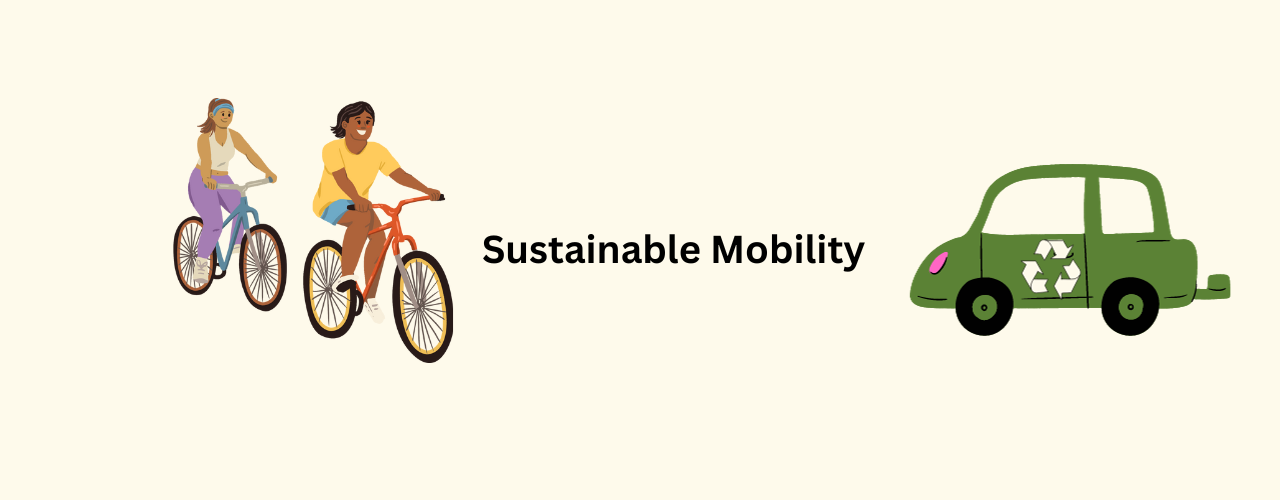Sustainable Mobility Tips: Making Your Daily Commute Earth-Friendly

The world is moving towards sustainable mobility at an accelerating pace, with a view to achieving a sustainable future. The shift towards electric vehicles and advanced transportation solutions is evidence of this change and is transforming the way we travel. In this article, we will explore sustainable mobility in detail, analyzing its importance, current trends, and the bright future it promises to bring.
The importance of reducing environmental impact in daily commutes
Have you ever thought about how your daily commute affects the environment? It’s actually pretty important! There are lots of good reasons to make your commute more eco-friendly. For example, it can help keep our planet healthy and reduce air pollution. Plus, it can make your trip to work or school way more enjoyable and stress-free! There are lots of ways to do this, like taking public transportation, biking, or even walking. And the best part is that you’ll be doing your part to create a greener and happier world for all of us!
Sustainable Mobility Definition
Sustainable mobility encompasses a comprehensive approach that amalgamates environmental, social, and economic aspects. It aims to offer efficient, eco-friendly transportation alternatives that limit the impact on the environment and fulfill the dynamic requirements of society. The focus is on developing sustainable modes of transport that can provide long-term benefits while addressing the challenges of climate change and ensuring economic viability. Key players in sustainable mobility are Electric Vehicles, Smart Cities, Micro-Mobility, Green Infrastructures, The Role of Businesses, Overcoming Challenges, Global Impact, Navigating Regulatory Landscapes, and Inclusive Mobility.
We can make our daily commute more eco-friendly by changing some of our daily habits. Here are some easy-to-follow tips that will help you reduce your carbon footprint.
The Rise of Sustainable Transportation
As the global community strives towards promoting greater environmental sustainability, the transportation sector has undergone significant changes. In this regard, electric vehicles have emerged as a popular alternative because they rely on clean energy sources that have a minimal impact on the environment. By adopting electric vehicles, individuals can effectively reduce their carbon footprint, thereby contributing towards a cleaner and healthier environment. The use of electric vehicles also supports the larger objective of achieving global sustainability goals, particularly in the context of reducing greenhouse gas emissions and mitigating climate change.
Embracing Public Transportation
Opting for public transportation is a straightforward and effective approach to enhancing the ecological sustainability of your daily commute. Buses, trains, and trams are excellent alternative modes of transportation that not only minimize pollution but also alleviate traffic congestion. By commuting collectively, we can all contribute to a more sustainable and efficient transportation system, ultimately leading to a greener and more sustainable future.
Active Commuting: Walking and Biking
Promoting a healthier lifestyle has become increasingly important in today’s society. However, it is not only beneficial to one’s personal health but also to the environment through the reduction of reliance on fossil fuels. Integrating physical activity into one’s daily routine while also reducing one’s carbon footprint can lead to a win-win situation for both individuals and the environment. This has been recognized as a sustainable solution that benefits both personal and environmental health.
Carpooling and Ride-Sharing
The maximization of vehicle occupancy through carpooling and ride-sharing is an effective strategy for reducing emissions. Participation in carpool initiatives and ride-sharing services not only decreases the quantity of vehicles on the road but also fosters a sense of community engagement. By promoting a collective approach towards transportation, individuals can actively contribute towards mitigating carbon emissions and demonstrate social responsibility.
Sustainable Infrastructure
Encouraging sustainable infrastructure initiatives is crucial. Governments should develop eco-friendly transportation options by implementing bike lanes, electric vehicle charging stations, and improved public transportation systems. Such initiatives can reduce greenhouse gas emissions and promote a cleaner environment. It is imperative that businesses and academic institutions take proactive steps towards promoting sustainable infrastructure.
The Impact of Remote Work
The proliferation of remote work has created a unique opportunity for curbing commuting-related emissions. The adoption of flexible work arrangements can play a pivotal role in fostering sustainability by reducing the need for daily commutes.
Eco-Friendly Vehicle Maintenance
In the event that one possesses a conventional vehicle, it is imperative to adopt ecologically sound maintenance practices. Consistent maintenance, appropriate tire inflation, and the use of environmentally friendly products all contribute to the enhancement of fuel efficiency, thereby curtailing the overall ecological impact associated with one’s vehicle.
Green Driving Habits
Drive smoothly, keep a consistent speed, and avoid idling to increase fuel efficiency and reduce emissions.
Investing in Sustainable Commuting Accessories
It is recommended that individuals consider investing in sustainable commuting accessories as a means of promoting a more eco-friendly lifestyle. This can be achieved through the use of items such as environmentally friendly backpacks, water bottles, and lunch containers. By making small changes to one’s daily habits, it is possible to contribute positively to the environment over the long term. These modifications can have a significant impact on the overall sustainability of one’s lifestyle.
Small changes in your daily mobility routine can make a big impact on the environment. Make conscious choices when commuting and inspire others to join the movement towards a greener future.
Overview of the key challenges in achieving sustainable mobility
Achieving sustainable transportation means creating a system that is good for the economy, the environment, and society. But there are many challenges to overcome. Here are the main ones:
- Environmental Impact: Cars that run on gas contribute to air pollution and climate change.
- Limited Resources: We rely on limited resources, like oil, to power our cars, and this can be a problem.
- Traffic: More people and cars on the road lead to more traffic, which wastes time and fuel and creates air pollution.
- Infrastructure Challenges: Not every place has good public transportation, and there aren’t enough charging stations for electric cars.
- Costs: Sustainable transportation can cost more money upfront, and some people can’t afford it.
- Social Inequalities: Not everyone has equal access to sustainable transportation, and some people could lose jobs if we stop using traditional cars.
- Behavior Change: People are used to driving traditional cars, and it can be hard to change their habits.
- Technology: New technology like self-driving cars and public transportation systems can be hard to develop and implement.
- Policies and Regulations: Different countries and regions have different rules about sustainable transportation, which can make things confusing.
- Safety: People might worry about the safety of new transportation technology.
To solve these challenges, we need to work together to create good solutions. Governments, businesses, and communities all need to work together to make sustainable transportation a reality.







